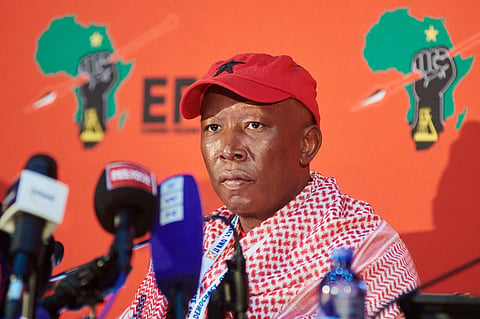EFF behind fresh attempt by politicians to control SA Reserve Bank – Patrick McLaughlin
In a bid to reclaim prominence, Julius Malema has once again proposed nationalising the South African Reserve Bank (SARB), reigniting a contentious debate. This marks his third attempt to position the EFF as champions against "white monopoly capital." Despite SARB's existing state ownership—where 90% of profits flow to the government—opposition parties are wary of Malema's intentions. As he prepares for parliamentary discussions, questions arise about the implications for investors and the broader economy.
Sign up for your early morning brew of the BizNews Insider to keep you up to speed with the content that matters. The newsletter will land in your inbox at 5:30am weekdays. Register here.
By Patrick McLaughlin*
All over again
In a bid to reclaim the spotlight since being overshadowed by Jacob Zuma's MK, Julius Malema has reintroduced the controversial proposal for the South African Reserve Bank (SARB) to become state-owned. This marks the third time the Economic Freedom Fighters (EFF) leader has brought the issue to Parliament, seemingly to bolster his image as a champion of the oppressed.
To start things going, Malema convened a press conference to launch his latest critique of "white monopoly capital," where an EFF spokesperson asserted, "Without national control over the issuance of money, no amount of legislation will achieve ownership transfer." This statement reflects the EFF's usual rhetoric surrounding what he now terms the South African Reserve Bank Nationalisation Bill—a provocative rebranding of the SARB Amendment Bill tabled in 2019 by Floyd Shivambu when an MP on the Finance Committee.
The Facts
In reality, SARB is largely state-owned already; 90% of its profits are directed to the government, while private shareholders receive only nominal dividends and wield no influence over management or monetary policy. Many share certificates exist as curiosities, with only a limited number held by overseas institutions. Serious investors obviously tend to shy away from this area.
Malema did not find it necessary to mention that the EFF proposal has already been reviewed by National Treasury, the Banking Association of South Africa (BASA) and SARB when parliamentary hearings were originally called for by the National Assembly's Finance Committee in 2020. The Bill was debated, never finalised, and fell away upon the closure of the Sixth Parliament.
Symbolism and Signals
The key difference between the two pieces of legislation lies in the symbolism and the underlying message Malema has sent to the international investment community on monetary controls and his party's ambitions. In addition, MK has added weight to Malema's recent initiative, with the inimitable Des van Rooyen stating that "MK's intent to nationalise SARB won them many votes". Show time it is, then.
Opposition parties, likely caught off guard, have issued statements that this is an attempt to undermine the GNU's good news. An uninformed person, they felt, might think the EFF is about to nationalise the SA central bank, Venezuela style.
Re-tread
We reported at the time on Shivambu's Bill that the 2020 parliamentary debate held by the Finance Standing Committee on Finance that the EFF's proposal called for a state-owned company to exercise control over a bank under the Companies Act, allowing it to apply for registration as a controlling entity.
We noted in our reports that Shivambu's SARB initiative faced minimal opposition since it was shown that SARB is already state controlled. Ninety percent of its profits flow to the government, while private shareholders receive minimal dividends and lack rights or involvement in monetary policy.
We noted that only South African shareholders can vote at the Annual General Meeting (AGM), with each allowed one vote per 200 shares, capped at 10,000 shares out of 2,000,000 issued. Shivambu claimed at the time, "Our proposal is to take the shares from 800-odd private shareholders to 57 million South Africans."
Precedent
The parliamentary discussions at the time featured significant input from BASA, SARB, and a National Treasury team led by Ismail Momoniat. BASA highlighted its commitment to ensuring that any new bank would adhere to the same regulatory framework as existing institutions. To mitigate systemic risks in financial markets, all insisted that the same resolution regime applicable to all financial institutions should extend to any state-owned entity and beyond that, they had little concern.
Treasury official Roy Havermann also cautioned about the "heightened risks" associated with a state bank, emphasizing that these risks could only be managed if strict regulations applied equally to state entities. Havermann warned, "The operating model of a state bank must not diverge dramatically from those of commercial banks."
Similar sentiments were echoed by BASA's Nobambo Mlandu and SARB's Unathi Kamlana. Yunis Carrim (ANC), then chairperson of the Finance Committee, stated, "I have no problem with any of this."
The Bill was never proceeded with due to the Covid-19 national state of disaster but with this on record it only remains to be seen how noisy Julius Malema will be in Parliament whilst he reinvents the wheel.
Most would prefer he refrained, but then again, that's Julius.
Read also:
*Patrick McLaughlin: Editor, parlyreportsa

